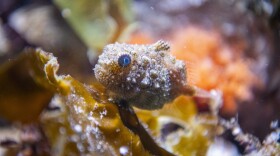http://stream.publicbroadcasting.net/production/mp3/kplu/local-kplu-976911.mp3
Parents who are hesitant about giving their children all the required immunizations have an unusual chance to share their views Tuesday. The national committee that decides when kids should get vaccines is taking testimony in Shoreline, north of Seattle -- inviting the public into a discussion of values. It’s just the second time they’ve asked for input.
They're looking at a specific new vaccine, involving a rare but terrifying infection. But looming large is the context: A two-year-old child entering day-care this fall would need to have vaccines against at least seven diseases. Including boosters, it would total 20 shots. Those would defend against polio, measles, and chicken pox, among others. A recent study found most parents have concerns about the number or safety of immunizations.
Ed Marcuse, professor of pediatrics at Seattle Children’s Hospital and the UW, says he’s been urging federal officials to bring the public into the decision process:
"It's terribly important that you get other people engaged in the discussions of values, not just the experts. Because experts have knowledge, but the experts' values don’t trump the values of the general public."
Every vaccine presents some trade-offs, which means there’s always a balance between values. It's up to a panel of 15 experts, appointed by the Secretary of Health and Human Services, to weigh the trade-offs and make the nation's vaccine recommendations. (Marcuse has served on ACIP, the Advisory Committee on Immunization Practices, in the past. The committee currently has two Seattle residents.)
The Centers for Disease Control has been reluctant to open up the process, partially out of concern activists or industry would hijack it. But the committee experimented with input during the pandemic flu crisis two years ago – and got some good advice about how to prioritize who got early access to the flu vaccine.
The latest quandry, a horrifying bacterium
Now there's a new childhood vaccine against meningococcal disease, which could be given to babies when they're just two months old. The catch, says Marcuse, is for some babies it doesn’t work. And it wears off:
"We have a vaccine that will prevent about half the disease, but not durable lifelong immunity. Do you make it a universal, for everyone? Or do you make it optional, for some?"
Marcuse says to factor in that a meningococcal infection is horrible. It can arrive so abruptly that over the course of a day you can go from healthy to death's door. He sees infected babies every year – and typically, if they survive, it’s after amputations and often some brain damage.
The meeting in Shoreline involves a full day of learning and debating. The CDC is hoping it will include not only local parents, but also doctors, nurses and others. They’re also getting input in three other cities. The federal ACIP panel will make its decision in the fall.
Pre-registration for the meeting is closed, and attendance at the meeting is limited to about 100 people . But officials say there will be room for a few people who show up at the door (Shoreline Conference Center, 18560 1st Ave NE, Shoreline, WA 98155). More information by calling 1-866-276-7083







